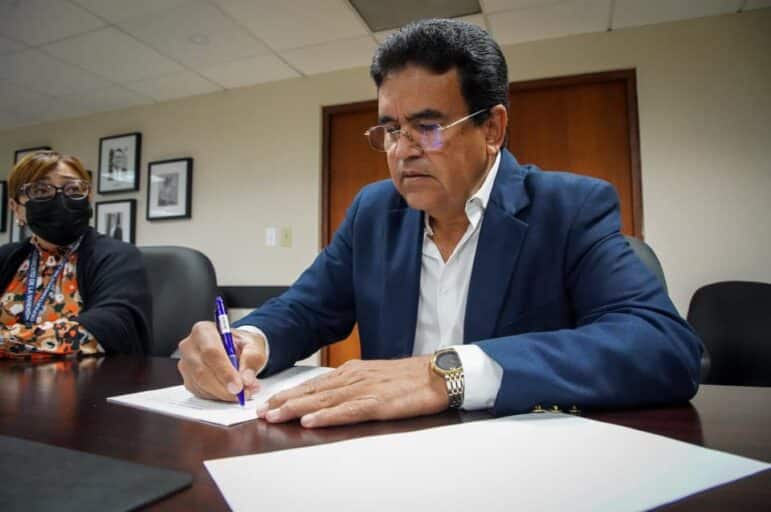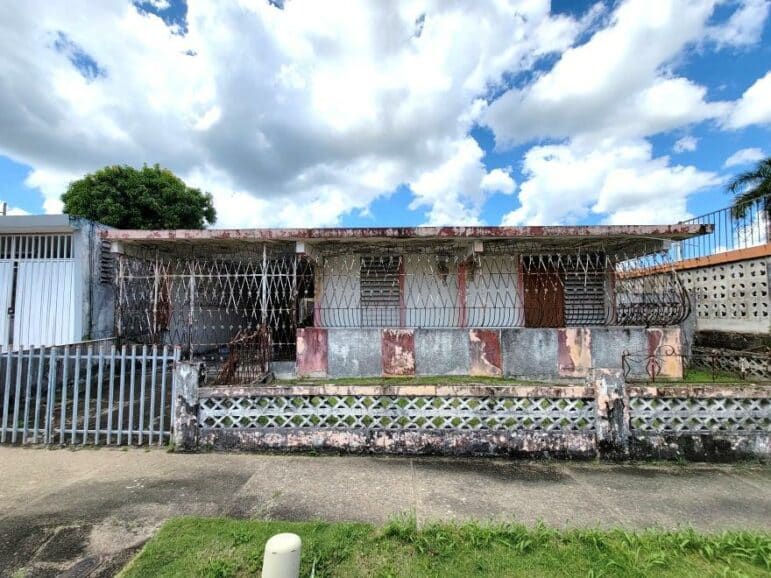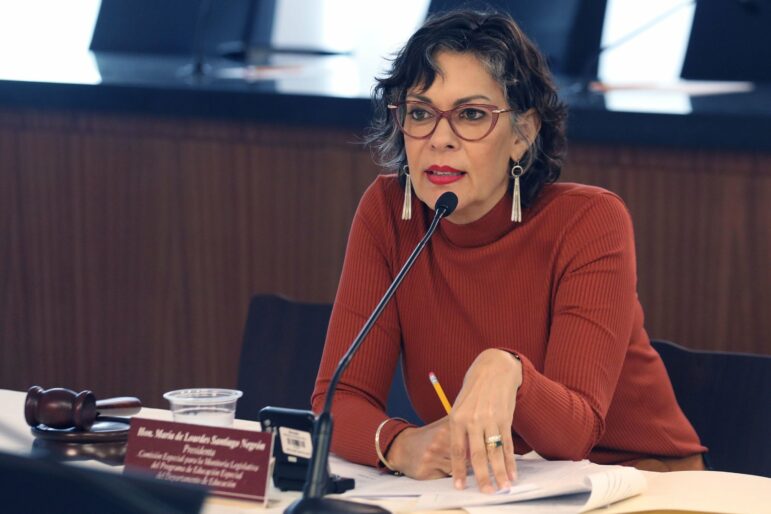Companies contracted by municipal governments to manage public nuisances and execute compulsory expropriations added to these processes a network of subcontracting and transactions in which all business partners — except municipalities — get economic returns in agreements that are invisible to the Puerto Rico Office of the Comptroller (OCPR, in Spanish) an investigation by the Center for Investigative Journalism (CPI, in Spanish) uncovered.
Francis & Gueits Law Office, one of the firms dedicated to overseeing public nuisances, proposed to the Municipality of Caguas a plan to dispose of abandoned properties and structures, according to the proposal attached to its contract with the municipality . It included the services of two lawyers from outside the firm. In turn, one of those attorneys subcontracted services to handle all the operational aspects necessary to present the eminent domain claims. An analysis of the invoices registered in the Superior Court shows that this network of services and subcontracting had the effect of adding a fee of $20,000 on the owners on top of the value of their properties declared public nuisance.
The mayor of San Sebastián, Javier Jiménez Pérez, told the CPI that in his town the local government handles managing public nuisances, the expropriation and sale of properties. An employee oversees the program, and the other technical services of appraisal, measurement, engineering, and legal representation are contracted directly by the municipality. He estimated the cost of those services to be between $4,500 to $5,000 per expropriated property.

Javier Jiménez Pérez, mayor of San Sebastián.
Courtesy photo
Jiménez Pérez explained that the engineer’s inspections cost $500, the surveyor establishes a fee of $1,300 to $1,600, the fees for the attorney that files the eminent domain claim are around $2,000 and he pays $500 for appraisal. The buyer of the public nuisance assumes the costs, and — as provided by the Municipal Code — also pays the appraisal price plus 10% for expenses.
“When you come down to it, for the Municipality — except for the assigned employee — there is no expense,” said the mayor, who holds a bid of the properties available for sale.
In Puerto Rico, 22 municipalities have contracted the services of Universal Properties Realty Government Services. The Municipality of Caguas is one of its clients, but Mayor William Miranda Torres also hired Francis & Gueits Law Office and City Renewall. More than a dozen municipalities have agreements with the Center for Habitat Rehabilitation for advice on these processes. In an interview last month, the mayor of Caguas told the CPI that he decided to privatize these services in search of a quick solution because that was one of the biggest concerns of the residents of his town after Hurricane María in 2017. Miranda Torres ended up canceling the agreement he had with Universal Properties after detecting “deficiencies” in their procedures. He referred the company to the Department of Justice.

Photo by Wanda Liz Vega | Centro de Periodismo Investigativo
Universal Properties also subcontracts services, including legal representation for eminent domain claims in court. The judicial record shows the entry and exit of several lawyers in the process. Two of them, María Padilla Mercado, and Luis Bruno Padilla, resigned due to differences with the company. Attorneys Ediltrudis Betancourt, Wyrie Correa de Jesús and Corally Ramos Padro briefly appeared on the Court’s record as lawyers in some expropriation cases, but they resigned almost immediately without having submitted briefs or appearing in court.
In the eminent domain lawsuits handled by Universal Properties, the company submits invoices of around $22,000 for each property. The Municipality does not pay for the services of Francis & Gueits or those of Universal Properties. These are expenses that are placed on the property to be expropriated and that reduces the compensation that the expropriated person would receive. The person or entity that will purchase the public nuisance pays these service charge invoices in full.
Caguas has the Francis & Gueits contract in effect, which charges close to $10,000 for legal representation in eminent domain claims and other legal services. The Municipality of Caguas assigned 263 properties to the firm.
The law firm delegated to Attorney Juan Hernández Rivera, from Naranjito, services that include legal analysis, registrations, certifications, property maintenance and notary services for which he charges more than $8,000. Among the services, he charges $100 in each invoice for the use of the escrow account of Encinales Realty, which belongs to his partner and manager of his firm, Herisbelia Encinales Franco.
The money paid by those who will buy a public nuisance is deposited in this special account. According to the purchase agreement and the judicial files examined by the CPI, the buyer writes out the manager’s check in the name of Encinales Realty, who deposits it in their bank account in escrow. Then, Encinales Realty deposits the amount of money in court — in the buyer’s name, if any — that will serve to compensate the expropriated owner.
In an escrow account, the financial institution becomes a sort of custodian of the money that a person or entity will use to pay for a purchase. It serves to guarantee the seller and the buyer that the funds will be available when the transaction is completed, and it does not generate interest.
In 25 of the 35 expropriation lawsuits filed between January 2021 and May 2023 by this firm, not a single penny was deposited in court to compensate those expropriated because the debts on their properties were higher than the appraisal value. According to the court record, 14 of those 35 properties only owed the $20,000 that Francis & Gueits invoiced.
That money that is paid to the Municipality for a property, which becomes its own through expropriation, is not under the scope of the Office of the Comptroller, because the money goes to the account of Encinales Realty, which is a fourth participant in the municipal transaction and because — as the CPI revealed in March — the contracts between the municipality and the buyer are not sent or registered with the OCPR.
Firm defends its billing
Francis said his firm’s billing for handling public nuisances “is in line with the market’s valuation for legal services of the same skill and difficulty.” He said these legal expenses cover the processing of the expropriation and all court appearances, expenses for photocopies, presentations, notifications, and prep meetings with experts.

Screenshot of the Rayos X program, Telemundo
In a hearing held March 20, 2023, at the Caguas Superior Court, Judge Elías Rivera Fernández thought that the management and maintenance expenses billed by the firm that handles the nuisance were unreasonable. At that hearing, in which Francis was the attorney of record, the judge stated that he did not understand how “miraculously all Municipal expenses equal home equity.” He also questioned the costs that were awarded to the demolition because they were higher than those that were calculated in another expropriation case that he presided over in his courtroom for a structure with similar dimensions.
At the hearing, Francis pointed out for the record his objections “with the categorizations that the court uses with respect to the exercise that the Municipality is carrying out. From the outset, it presents us, perhaps, with an aspect of prejudice.”
The judge said he was not questioning the integrity of the procedure, but that his obligation was to ensure the interests of the public coffers and fair compensation.
“The Court is who must decide here, and the Court is not naive. We have years, gray hair, and dark circles [involved] in this. There are some amounts here that must be contributed [for fair compensation],” he said, later revealing that he held a real estate license for 23 years.

Photo taken from the appraisal
Subcontracts to family and friends
According to the proposal that Francis & Gueits Law Office delivered to the Municipality of Caguas, the other lawyer who would work on what the firm called Public Nuisance Rehabilitation would be Maialin Steidel Figueroa.
As opposed to the representation that he made in his proposal to the mayor of Caguas, Francis told the CPI in written statements that the lawyer “is not part of the project to eliminate properties declared as public nuisances. From time to time, she has been contacted as a notary for the sole purpose of granting the deed in which the Autonomous Municipality of Caguas and the buyer appear, after the court has issued a judgment validating the expropriation exercise carried out by the municipality.”
In fact, among the 121 court files examined, the CPI did not see that this lawyer — wife of the Court Administration’s administrative director, Sigfrido Steidel Figueroa — intervened in the litigation of the eminent domain claims filed in the Superior Court. She worked on just one of the deeds of sale of a nuisance that the Municipality of Caguas sent to the CPI.
However, three separate sources told the CPI that Francis makes frequent references to the access he allegedly has to the Court Administrator. Bailiff Carlos Delgado Cruz left on record, in an informative motion filed on October 18, 2022, a telephone conversation he had with Francis in which Francis told him that he had discussed with Steidel Figueroa the difficulties he perceived in understanding eminent domain cases in courtrooms outside the specialized Expropriation Court in San Juan.
That conversation took place when Delgado Cruz served a court order in the Mansiones del Golf complex, which the municipality owns — through Francis & Gueits — and that it is trying to expropriate. Banco Popular is blocking the expropriation because it is a mortgagee on the luxury residence.
According to the bailiff’s informative motion, Francis “referred to civil case number CG2021CV03096, on FORCED EXPROPRIATION arguing about this Act and indicated that these cases were seen in specialized courtrooms of the San Juan Judicial Center and that, therefore, we were unaware of the processes, that he did not understand the reason for my presence [in the public nuisance], that he held a meeting with Judge Sigfrido Steidel Figueroa, Director of the Court Administration and that he was aware of these matters.”
Both Steidel Figueroa and Francis denied to the CPI that such a meeting took place. Francis also denied that he had referred to the bailiff of that alleged meeting, although he admitted that he had a conversation with the bailiff about legal proceedings in forced eminent domain claims. The lawyer admitted, that in an informal conversation, “I mentioned to the judge that expropriation cases were previously dealt with in specialized courtrooms in the San Juan Superior Court and that, although the Municipal Code provided for them to be dealt within the jurisdiction where the property is located, this change in jurisdiction had generated confusion in handling the cases.”
Steidel Figueroa acknowledged that he has “a friendly relationship with Francis that precedes the start of the legal proceedings that his office handles in this type of lawsuit.”
He also said, “regarding the mention of my person in an exchange, as alleged in the motion that he refers to, I disapprove of any representation that a party or their lawyer makes to a Court official that involves my name to advance proposals in a court process.”
Although the directors of Universal Properties were also asked for a reaction on the appraisals and billings made by their company, none of them answered the CPI officially. José Deyá González, who was listed as vice president of this company, speaking only for himself, contacted the CPI after the published investigation and in an insulting and vulgar tone indicated that he is no longer part of Universal Properties. He acknowledged that through his corporation JJ Inversiones he tried to buy some properties declared public nuisances that Universal Properties managed. He said he didn’t get to buy any of the properties because his lawyer warned him that he couldn’t wear “both hats.”

Screenshot of the Rayos X program, Telemundo
Appraisal process under investigation
The Real Estate Appraisers Examining Board received several complaints against some of these professionals, the CPI learned. The investigation has been ongoing for several months and is based on the methodology used by appraisers subcontracted by the firms that manage eminent domain in the municipalities.
José Robles Korber, chairman of this Board, confirmed the investigation. “The Board is in an investigative process in accordance with the legal statutes that shield it.” Appraisals, he explained, must be done in accordance with the Uniform Standards of Professional Appraisal Practice.
As part of the investigation, the members of the Examining Board summoned appraiser Natalia G. Rivera Ortiz in March, who was accompanied by Francis, the CPI learned. The lawyer argued before the Board in favor of the methodology used by the appraiser in expropriation cases handled by Francis & Gueits Law Office.
Rivera Ortiz confirmed to the CPI that she appeared before the Examining Board but did not give details because there is an ongoing investigation. “Yes. I was summoned and there’s an ongoing investigation,” she acknowledged.
An investigation published by the CPI last week revealed that 84% of the appraisals submitted by both Francis & Gueits and Universal Properties in eminent domain lawsuits conclude that the properties should be demolished. To determine this, only the value of the land is appraised and the costs of demolition and the removal of rubble are subtracted, although the municipality never incurs this expense.
The practical effect of this is that it eliminates the possibility of the expropriated owner from getting any payment for their property. The benefit for the buyer is that it further reduces the price that they will pay for the property, which had a reduction in the depreciation assessment since before the calculation of its demolition. In 87.5% of the expropriations carried out, not a penny was consigned in court to compensate the expropriated owner, as the judicial record shows.
Francis said that due to the characteristics that these properties usually have and their lien in the Property Registry as a public nuisance, the appraiser makes a “cost approach to be able to arrive at the valuation that most reflects the real condition of the property.”
“In the case of the appraisal, it’s not that the demolition of the structure is recommended, but what is done is an analysis of the cost of repairs versus the demolition and construction of a new property,” Francis said.
Experts consulted by the CPI, who preferred to remain anonymous, acknowledged that public nuisance assessments follow parameters that consider what is the best use of the property: if the land is worth more than what is built on it, it is concluded that the best option is demolition, as not all public nuisances necessarily require demolition. Similarly, to support that recommendation, the appraiser must prove that both alternatives were analyzed, and that the property is best used without the existing structure.
However, one of the sources consulted linked to the real estate market said the appraisers of these companies automatically determine that all structures declared a public nuisance are worthless or that their repair is not cost effective and that, therefore, the only value that the property has is its land.
“If the land, minus the demolition cost, is worth more than what is built on it, then the best use of the property is just the land. So, they already assume [that this is how it is] but they demonstrate that. I must prove it with an appraisal. I must show that the land is worth more than the building as it is,” said one of the sources consulted. “They assume that, since it’s a public nuisance…they value the land, they deduct the cost of demolition and then they deduct all the costs incurred and due for upkeep from [the value of the property],” he added.
The methodology is not the only objection these appraisals face. In a hearing in Judge Rivera Fernández’s courtroom in Caguas, he ordered Francis & Gueits to do the appraisals again. Rivera Fernández said the value of the land used as comparable was not averaged out to get a fair valuation, but instead, the lowest value was chosen among those compared.
“The comps of the land were not worked fairly. They took the cheapest value within the same neighborhood, when there were — among their same comps — some fluctuations, [from which] an average could be found,” the judge said.
Burdensome contracts?
Real estate broker Roberto Carrasquillo believes the privatization of managing eminent domain generates “more controversies than results.”
“What there is, is speculation with public nuisances in more than 20 municipalities and — in the long run — the municipalities are not going to solve the social problem that the nuisances represent with these burdensome contracts,” said Carrasquillo.
Carrasquillo believes the appraisals presented by these companies to the court in the eminent domain claims “do not conform to the reality of the markets.”
“For me — as someone who is in the markets every day — it’s very hard to believe that a two-story property in Turabo Gardens in Caguas with four apartments is appraised at $22,000,” he said.
Melissa Montero, president of the Puerto Rico Realtors Association, said the process to dispose of properties declared eminent domain should be an open auction so that there is a greater participation of people interested in buying them.
“That’s a mystery. We don’t have access to an inventory of public nuisances. The problem is that municipalities don’t necessarily hold auctions. If they had done it through an auction, I can assure you that more than one company would show up,” she said.
Montero recommended that legislation be drafted to make it possible to acquire public nuisances through bank financing, since not everyone can buy in cash, which limits access to these properties.
NIE visits municipalities
The Department of Justice did not reveal the status of the investigation it is carrying out on the operations of these companies that manage eminet domain in the municipalities. The agency said it would not comment on the investigation because it is ongoing. Sen. María de Lourdes Santiago and Rep. Denis Márquez, both of the Puerto Rican Independence Party (PIP, in Spanish), referred this matter to the Department of Justice and the OCPR, after conducting a preliminary investigation.

Photo by José A. Reyes | Puerto Rico Senate
Sen. Santiago told the CPI that a prosecutor and an agent interviewed her in her office about the findings contained in her referral. She has not received word from the OCPR or the Municipality of San Germán, from whom she requested information on the same subject.
“I also know that agents from the [Justice Department’s] Special Bureau of Investigations have been going to different municipalities, asking for documentation from Universal [Properties],” Santiago said. “I know that they already went to San Germán. I don’t know which others, but they’ve told me that they’re going to all the municipalities that have a contract [with these companies],” she said.
“It seems inexplicable to me that there are mayors who, far from following the example of some of their colleagues, as in the case of Caguas, with Canóvanas and Loíza, continue a contract that has resulted in several illegalities,” said Santiago. “We hope that the mayors understand the seriousness of the matter,” she added.
The Senator said the municipalities have failed to comply with the Municipal Code by not having available to the public an inventory of properties declared public nuisances, nor a specific municipal ordinance to authorize each expropriation. The PIP legislators referred the public nuisance administrators given the possibility of fraud to the Department of Justice, violations of real estate business regulations, the General Expropriations Act, the Municipal Code, and the possible improper management of public funds.
“The Municipal Code clearly states that when the municipality decides that a property declared a public nuisance is not going to be destined for public utility, be it a field or park, something of general benefit, but that it’s going to be put up for sale for third parties, there must be an inventory of properties. We made a request for information through the Senate. Eleven or 12 municipalities [out of 78] have answered it. No municipality has that inventory as the law says, because the law requires that the location of the structure and the appraisal is included,” the Senator explained.
Vanessa Colón Almenas is a corps member of Report For America.
Next in Series
8 / 8
¡APOYA AL CENTRO DE PERIODISMO INVESTIGATIVO!
Necesitamos tu apoyo para seguir haciendo y ampliando nuestro trabajo.


